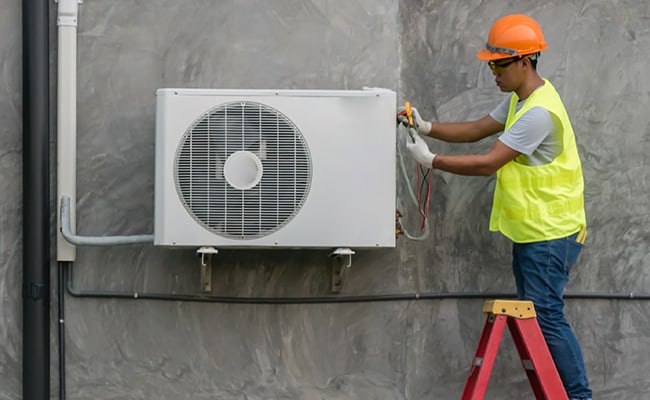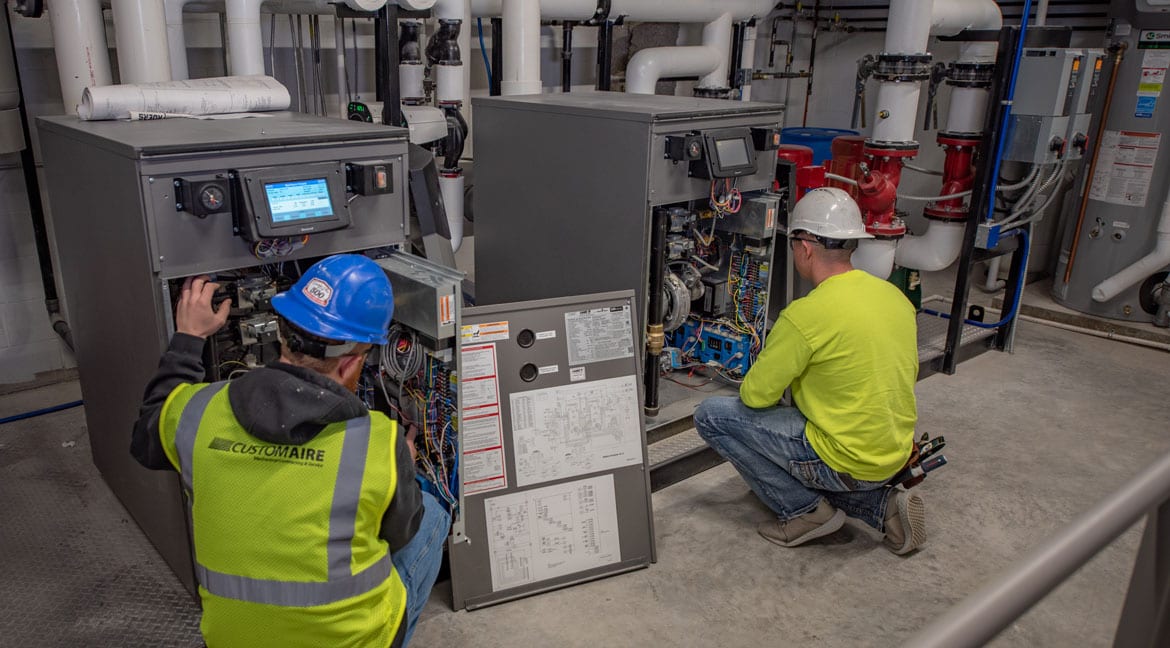Why ductless mini splits Compare to Traditional HVAC Systems
Why ductless mini splits Compare to Traditional HVAC Systems
Blog Article
Exactly How a Warmth Pump and Heating System Interact to Optimize Your Home's Home heating Effectiveness
Recognizing how a heatpump and heater interact is essential for house owners seeking efficient home heating services. Each system has its staminas, providing a balanced technique to home convenience. The warmth pump masters modest temperature levels, while the furnace supplies fast heat throughout severe cold. This harmony not only decreases energy expenses however also enhances the lifespan of both devices. What variables influence this partnership, and how can homeowners optimize their benefits?
Recognizing Warmth Pumps: How They Function
Many individuals may be unfamiliar with their internal operations, warm pumps play an important function in contemporary home heating systems. These gadgets run by transferring heat from one location to another, making use of the principles of thermodynamics. In cooler months, a heatpump removes warm from the outside air, ground, or water, and transfers it indoors to heat the space. Alternatively, during warmer months, it can turn around the procedure, serving as an a/c by getting rid of warm from inside to the outside.Heat pumps contain an evaporator, condenser, compressor, and development shutoff. The refrigerant within the system absorbs heat as it evaporates at reduced temperatures and pressures. The compressor after that increases the stress and temperature level of the cooling agent, allowing it to release warmth as it condenses. This reliable process can greatly reduce power usage contrasted to traditional home heating methods, making heatpump a lasting choice for climate control in homes.
The Duty of Furnaces in Home Home Heating
Heaters play an important role in home heating by offering a trusted source of warmth during the cooler months. They run by generating heat with burning or electric resistance, distributing it throughout the home through air ducts or glowing systems. The efficiency of a heating system is commonly determined by its Yearly Fuel Use Effectiveness (AFUE) ranking, which indicates just how efficiently the device transforms fuel into heat.Furnaces can use different power sources, consisting of natural gas, oil, electrical energy, or gas, permitting house owners to pick one of the most ideal option for their requirements. Unlike heatpump, which may have a hard time in extreme chilly, heating systems keep constant efficiency, ensuring that interior temperature levels continue to be comfortable despite outdoor conditions. Furthermore, modern heaters usually come equipped with sophisticated technology, such as wise thermostats and variable-speed blowers, improving their effectiveness and responsiveness. This flexibility makes heaters an essential component in comprehensive home heating approaches.

Advantages of Making Use Of Both Systems With Each Other
Integrating the strengths of both heating systems and heatpump can cause a much more reliable and efficient home heating remedy. Utilizing both systems allows house owners to make the most of the heat pump's power efficiency during milder temperature levels while relying upon the furnace for even more severe cold conditions. This twin approach can greatly minimize energy prices, as warm pumps consume less electrical energy than standard home heating approaches when temperatures are moderate.Additionally, using both systems with each other can boost comfort levels in the home. Warm pumps can offer constant, also home heating, while furnaces can swiftly increase ambient temperature levels when needed. Additionally, the integration of both systems can expand the life expectancy of devices by lowering wear and tear on each system, as they share the workload. Eventually, home owners can delight in a well balanced, affordable heating option that changes flawlessly to varying weather condition conditions, making certain a warm and inviting home throughout the cold weather.
How Heat Pumps and Furnaces Enhance Each Various Other
They produce a complementary heating system that takes full advantage of effectiveness and convenience when property owners incorporate warm pumps and furnaces. Heatpump run by moving heat from the outside air or ground, making them highly efficient in moderate environments. They stand out throughout milder temperature levels, providing economical home heating. Conversely, heaters produce warm via combustion or electrical resistance, delivering strong, prompt warmth during severe cool conditions.The combination of these 2 systems permits vibrant modifications based upon temperature variations. Throughout warmer months or milder winter months days, the heat pump can take the lead, preserving energy and lowering prices. As temperature levels decrease, the heater can effortlessly engage, making certain consistent warmth throughout the home. This harmony not just enhances power usage but likewise enhances the life expectancy of both systems, as each unit operates within its perfect performance variety. Together, they produce a balanced atmosphere that adapts to varying climate needs.
Optimizing Effectiveness: Tips for Homeowners
Home owners can improve their home heating efficiency through numerous functional strategies. Developing a regular upkeep timetable, integrating smart thermostat technology, and implementing efficient insulation and sealing options are essential actions. These steps not just enhance convenience but also decrease power costs.
Normal Maintenance Schedule
To guarantee optimal home heating efficiency, establishing a normal upkeep schedule is crucial for any kind of home. Homeowners must focus on routine evaluations of both heatpump and heaters to establish peak performance. This includes changing air filters every one to three months, as clogged filters can greatly minimize effectiveness. In addition, organizing specialist maintenance at the very least annually permits service technicians to determine and attend to potential concerns before they rise. Home owners ought to additionally cleanse the warmth pump's outdoor unit to avoid a fantastic read debris build-up that can hinder air movement. By sticking to a routine upkeep timetable, home owners not just boost their furnace' efficiency yet likewise expand their life expectancy, bring about greater comfort and lowered power prices throughout the colder months.
Smart Thermostat Combination
Incorporating a smart thermostat into a home heater can significantly improve power effectiveness, especially as it enables specific control over temperature settings. These tools can learn the house owner's schedule and preferences, automatically readjusting the temperature to enhance convenience while lessening energy use. They can reduce home heating during times when the home is vacant, reducing unneeded usage. Numerous clever thermostats website here also provide real-time energy usage data, making it possible for homeowners to make informed choices regarding their heating behaviors. In addition, remote access via smart device applications permits users to change setups from anywhere, guaranteeing the home is cozy upon return. Generally, wise thermostat assimilation not just improves comfort but significantly contributes to energy savings and effectiveness.
Insulation and Sealing Solutions
Smart thermostats play a critical function in power effectiveness, yet their efficiency can be greatly boosted by proper insulation and securing solutions. Home owners need to focus on protecting attics, wall surfaces, and floors to decrease heat loss. High-quality insulation products, such as spray foam or fiberglass, can considerably improve thermal resistance. Additionally, securing gaps around home windows, doors, and ducts avoids chilly air infiltration and warmth escape. Weatherstripping and caulking are effective techniques for addressing these leakages - heat pump service. Normal assessments for air leaks, together with using blower door tests, can help recognize problem locations. By purchasing insulation and sealing, house owners can optimize the efficiency of their heating unit, eventually leading to minimized energy consumption and lower utility costs
Common Misconceptions About Warm Pumps and Furnaces
What misconceptions border heatpump and heating systems? Numerous people mistakenly believe that heatpump are inefficient in cooler climates. In truth, contemporary heat pumps are made to run efficiently even in reduced temperature levels, providing reputable heating throughout winter season. One more typical misconception is that heaters are always more efficient than heatpump. This depends on the specific energy sources and efficiency scores of the units in inquiry. Some may likewise believe that utilizing both systems simultaneously here are the findings is unneeded, yet as a matter of fact, this mix can enhance home heating efficiency, especially throughout extreme climate condition. In addition, individuals typically think that warmth pumps call for continuous maintenance, when in reality, they have comparable maintenance requires to typical heating systems. By unmasking these misconceptions, homeowners can make more informed choices concerning their heating choices, inevitably bring about improved comfort and energy effectiveness in their homes.
Maintenance Considerations for Combined Systems

Frequently Asked Concerns
Can Heat Pumps Work Efficiently in Incredibly Cold Climates?
Heatpump can battle in extremely cold climates due to minimized performance and heat removal constraints. Nevertheless, innovations in technology have actually caused designs made for far better efficiency in such problems, improving their stability in harsh atmospheres.
For How Long Do Heat Pumps and Furnaces Normally Last?
Heatpump normally last 15 to 20 years, while heating systems have a life expectancy of 15 to three decades. Normal upkeep can expand their longevity, ensuring reliable procedure and minimizing the demand for premature replacements.

What Is the Typical Price of Installing Both Systems?
The typical cost of mounting both a heat pump and a heater usually ranges between $5,000 to $10,000 - heat pump installation ooltewah tn. Elements influencing this cost consist of system size, installment complexity, and local labor prices
Exist Tax Obligation Incentives for Making Use Of Energy-Efficient Heating Systems?
Several house owners make inquiries regarding tax incentives for energy-efficient home heating systems. Various government and state programs frequently supply credit scores or discounts, encouraging the fostering of sustainable technologies to reduce energy consumption and advertise ecological responsibility.
Just how Do I Choose the Right Size Heat Pump and Heating System?
Choosing the appropriate dimension heatpump and heating system involves determining the home's square footage, considering insulation top quality, and examining neighborhood climate. Consulting a specialist can ensure excellent system efficiency and energy efficiency based on specific demands. heat pump service. Understanding how a warmth pump and heater job with each other is crucial for home owners seeking effective home heating solutions. In chillier months, a warm pump removes warmth from the outdoors air, ground, or water, and transfers it inside your home to warm the living space. When house owners incorporate warm pumps and heating systems, they produce a corresponding home heating system that makes the most of effectiveness and comfort. Warmth pumps run by moving warm from the outside air or ground, making them extremely reliable in modest environments. Warmth pumps can have a hard time in very chilly climates due to decreased efficiency and heat extraction limitations
Report this page